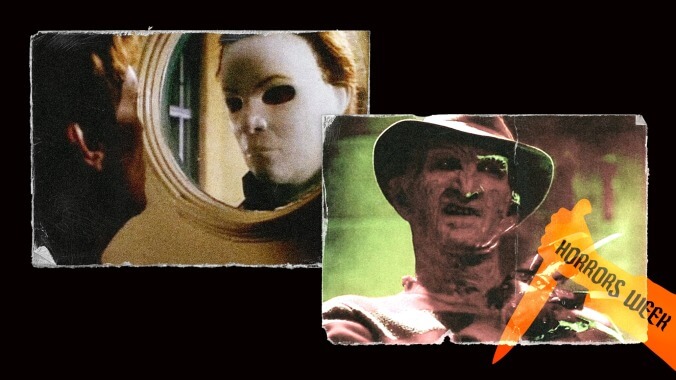Is Halloween or A Nightmare On Elm Street the greatest slasher-movie franchise of them all?
Round 5: It’s Freddy versus Michael Myers in the grand finale of our Ultimate Slasher Franchise Tournament
Image: Graphic: Natalie Peeples
Having triumphed in the first, second, third, and fourth rounds, two franchises remain. Here, in the finals, the madman stalker of the ’70s takes on the quipping, deformed nightmare terrorizer of the ’80s. Who will take it home: the killer who never says a word, or the one who never shuts up? Keep reading to see which of these long-running series we name the winner of our Ultimate Slasher Franchise Tournament. And then scroll past those results to the readers poll, where you, the fans, have a chance to name a different winner.
Maybe it was always going to come down to these two. The unholy monsters of suburbia. The leading bogeymen of the box office. America’s favorite unkillable killers. One basically kicked off the whole slasher-movie craze of the ’80s—his was the blank, rubber William Shatner face that launched a thousand ships through a thousand bays of blood. The other arrived right when the subgenre was beginning to peter out, extending its life by introducing a different kind of homicidal villain: smaller frame, bigger mouth, powers his masked contemporaries couldn’t, uh, dream of.
With apologies to Jason Voorhees, whose series got knocked out of this tournament a couple rounds back, Michael Myers is the true strong and silent yin to Freddy Krueger’s yang. Mike is death personified. He just keeps coming and killing, a Duracell battery of malevolence. He has no pretensions, just unquenchable bloodlust. Freddy is his opposite number, the McEnroe to his Borg, the demonic clown to his pokerfaced straight man. He’s the rock star, the showman. He’ll make a whole production out of ripping out your insides. The two could be a classic comedy duo, a study in contrasts.
Their franchises, both spawned by all-time-classic originals from the respective minds of John Carpenter and Wes Craven, aren’t so different. At their worst, they follow standard slasher protocol, feeling like body counts in search of movies. They have hummable, instantly placeable main themes built on a simple repetition of notes—lullabies to traumatize. On a deeper level, both link their evil to the festering psychic underbelly of American small-town life, and to the mistakes of parents either absent or lawlessly vengeful. “There’s an Elm Street in every town,” Freddy croaks in the worst of his Nightmares, the falsely “final” one. Could that include sleepy Haddonfield?
Only Scream, Wes Craven’s other enduring slasher series, can boast a heroine with a longer life expectancy than those of Halloween and A Nightmare On Elm Street. Laurie Strode (Jamie Lee Curtis) has come and gone, died and been brought back nearly as many times as her relentless stalker—she truly embodies Carol J. Clover’s theory that the Final Girl, not the killer, is our true point of identification in these movies. It’s only slightly less frequently that Elm Street has redrafted its own original scream queen, Nancy; she’s at the center of that franchise’s two most beloved entries—or three, if you count New Nightmare, which cast star Heather Langenkamp as herself.
Of course, neither of these series has been immune to the dangers of overexposure—the way a monster can become less scary the more we see him. This is one place where Michael has the edge. His stark simplicity as an icon—he’s practically a silhouette of evil, a sentient mask and knife—has vacuum-sealed his fearsomeness. The Halloween movies may get dumber along the way, and they certainly grow repetitive, but The Shape remains effectively scary in his single-minded deadliness. He’s the Coca-Cola Classic of modern screen terrors, unimprovable, always in vogue.
Freddy, on the other hand, is more like a hardcore band that lost its edge when it reached for the big-label big leagues. It’s conventional wisdom at this point that the Elm Street sequels zapped his power by turning him into a jokey court jester: The mass-murdering specter as hacky vaudeville comedian, tossing out one-liners so bad even Arnold would veto them on the set of a contemporaneous action vehicle. Freddy might be even more of a household name than Michael, but at what cost? His arc from shadowy menace into poster boy anti-hero of ’80s excess does him no favors here.
Yet undead Fred has other tricks up his striped angora sleeve. Halloween won the last round by virtue of relative variety—for the way the series has kept itself alive through offbeat execution and tweaks to its rather rigid formula of executions. But those movies look like interchangeable reruns compared to the built-in malleability of Elm Street.








































